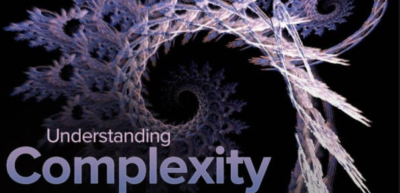
Many of us are learning about complexity. It’s not knew. This has been essential in most eras of change. There’s a personal relationship, or ongoing apprenticeship, that is needed to learn about complexity. There’s also a broader system level of learning that counters so much of how we’ve assumed that organizations work. Many of us are learning about more accurate positioning of the mechanized story of people and organizations. It matters that the early 1900s initiated a whole movement that divided labor and maximized productivity. There are times that of course remain, when operations are very dependent upon such efficiencies, but such mechanized operating modes are only one of several choices.
Some of my learning about complexity lately has been listening to a series of lectures by Scott Page, a math, economics, and systems theorist. Page first names that there is an inevitability of needing to become more aware and able with practices applied to complex systems. So, might as well get a bit more savvy. You can wish that one country’s denial stance on climate change doesn’t impact another country’s affirming stance. But it remains true that the wind doesn’t pay attention to stances when it blows pollution one direction or another.
Page goes on to name four characteristics of healthy and robust complex systems that I find myself paying attention to, particularly to some of the common resistance or just plain difficulty of applied practice in regards to these characteristics.
- Connected — for a complex system to be healthy and robust, there must be connection. I’m thinking people systems as much as anything here. It’s the work behind the work, the thing behind the thing — so much of the work that I do is about creating connection among people, teams, etc. So much more going on than creating a nicety and momentary feel good. It’s why, for example, a series of small table conversation in a World Cafe, can become essential experience for a group working their way towards a new strategic plan.
- Interdependent — no one person can do all that is required in a complex system. There is dependence upon others. There is interdependence. We want to add interdependence, going together, rather than decrease it if the overall system is to be more robust. This contrasts so much of the rugged individual that is so deeply engrained in western culture in particular. I continue to love the African proverb, “If you want to go faster, go alone. If you want to go further, go together.” Interdependence is part of this surrender to going further.
- Adaptive — so much of the work in organizations and its peoples these days is fostering an orientation to not just maintaining systems and procedures, but adapting them with insights to carry us through changed and changing circumstances. When the cold weather comes and your trying to protect a garden harvest, it doesn’t do much good to talk about how the last 20 years of weather were different. If you want to save your garden, you have to adapt and try a few new things. Cover the tomatoes. Warm air fans to get through the night. A well placed fire to keep the grapes protected. Consistency matters — this is the story that most of us train to. However, it’s adaptation from the consistency that gives us overall more health and robustness.
- Diversity — diversity of peoples, age, background, gender, experience, perspective, ideas. In an ecosystem, one species can be impressive for its size and scale. But it can also be peculiarly vulnerable. One infestation of beetle or larvae can wipe out forest species. It’s diversity that can save the forest as a whole. Segregation in human systems are more often political, economic, and habitual. Yes, human systems require policy change to go with a bunch of heart changes. However, life is always happening at the edges where differences are welcomed to intersect. Again, diversity is for robustness, not for temporary accommodation.
Many of us are learning. About language. About practice. About tools and methods to help find our way in the inherent messiness that complexity reveals of what already exists. So much of the work these days is reorienting ourselves to a more informed approach in the complexity that already is. There just isn’t room (and perhaps never was) to deny or avoid the complexity. Might as well get more savvy together — insisting upon diversity, adaptivity, interdependence, and connection.
